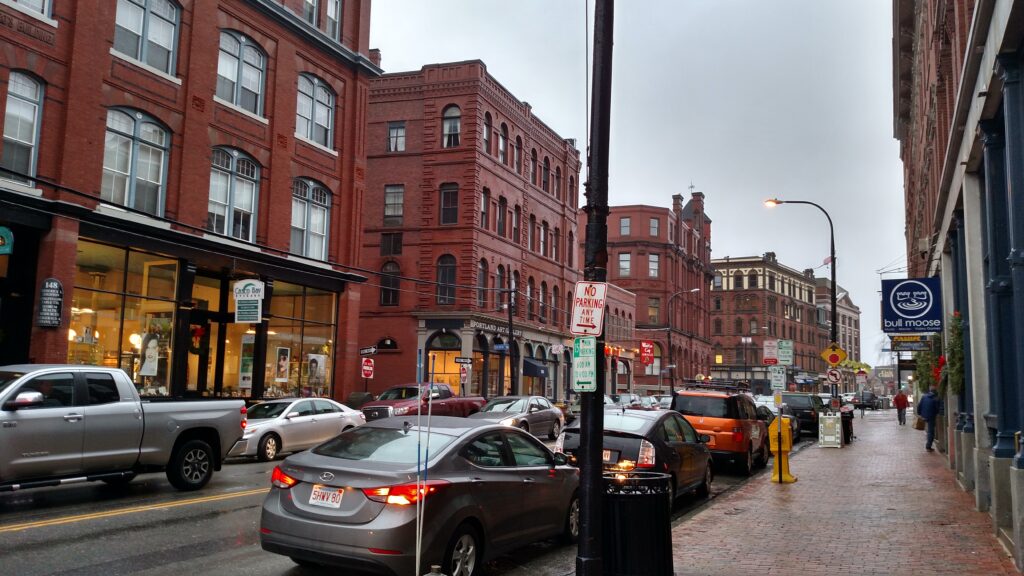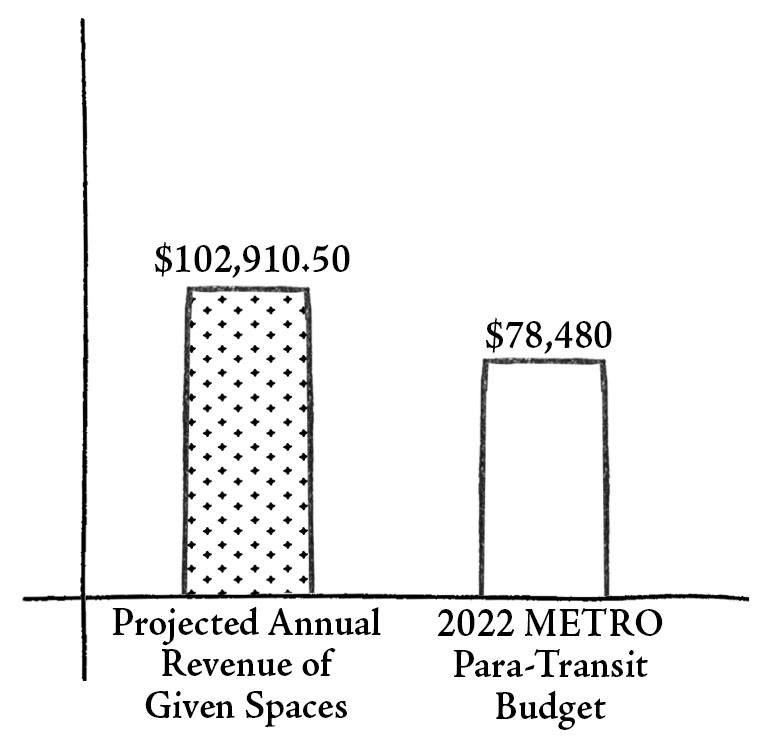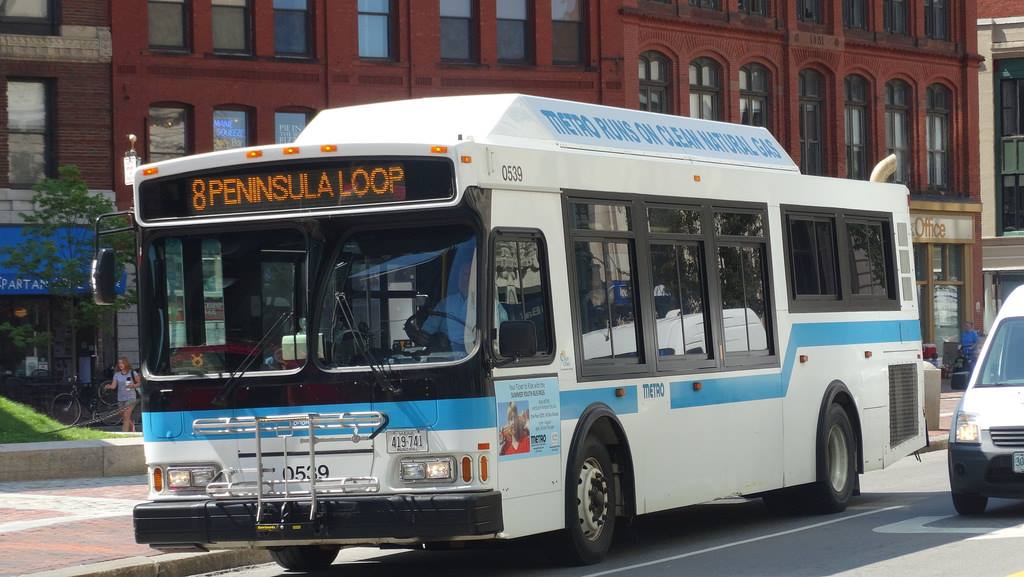The City of Portland is facing a budgetary shortfall of over 10% just to maintain funding for existing services. At Monday night’s emergency City Council meeting, the Council postponed all budgetary items on the agenda while we await the arrival of a hoped-for state bailout. Without state assistance, the Council faces tough choices about raising property taxes and cutting city services.
But while the Council postponed these difficult budgetary decisions, they were prepared to approve one order without any discussion of its financial impacts at all.
This was the order to permanently set aside 22 downtown street parking spaces on Thames and Hancock Streets, in the immediate vicinity of the ferry terminal. These would be designated as Island Residential Parking Zone (IRPZ), allowing those with Island Resident parking permits to store their cars downtown for no cost and with no time limits.

Multiple callers (myself included) gave public comments against the order, which councilors confessed they had not anticipated any discussion on, and perhaps had not seriously considered. What each of the callers pointed out – and what Councilors and city Staff have failed to fully reckon with – is that assigning these valuable downtown street spaces permanently to the IRPZ is a substantial loss of potential revenue to the city.
Based on data from a 2017 parking study by the City of Portland, downtown metered parking spaces are occupied for a minimum of 63% of the 9 hours per day they are metered, and average utilization is even higher. If we estimate there are 300 metered days per year, a conservative estimate of annual parking revenue from the 22 spaces in question would be $102,910.50 per year.
The revenue these parking spaces could have generated as metered spaces is 4% of the tax revenue spent on our Metro transit system in 2022 ($2,458,362) and could have entirely funded the portion of that total that goes towards Para-Transit, the service for those unable to ride Metro buses ($78,480.) The revenue from these parking spaces could have paid for 6% of what the city spent last year on street and sidewalk maintenance ($1,771,424), or it could have funded 79% of the Health Equity Program that brings health services to minority populations ($130,838.)

These are all essential city services, and in the absence of state assistance to close the city’s budget deficit, cuts to any of these services are potentially on the table. Given a hypothetical $100,000 of additional annual revenue, could the city provide a benefit greater than free parking to 22 car owners? Could that benefit be distributed among our city’s residents more equitably than to only 22 car owners? Are there city services more essential than free parking that we might fund with an additional $100,000 per year? Instead of weighing these alternatives, the Council chose to allocate this valuable city-owned asset to 22 car owners for free – a benefit of $4,677 per person.
During the Council’s discussion, much was made of the cost burden on islanders who, without the ability to drive their cars directly to their homes, require a substitute for the free residential street parking that is available directly adjacent to the homes of many mainlanders.
But the city-owned land used for residential parking on the mainland is by definition residential, existing in neighborhoods that are more peripheral to the city center. The land being used for parking in these neighborhoods is far less valuable, and the demand for parking for non-residents is far lower to begin with. These neighborhoods are also further from popular destinations, forcing greater car dependency on their residents.
By contrast, islanders are brought by public transit – the ferry – into the heart of the city. The land adjacent to the ferry terminal is not only far more valuable than typical residential land, but the surrounding area is a destination for far more people than an exclusively residential neighborhood. These blocks of Thames and Hancock are home to cafes, restaurants, shops, the AC Marriott, and the headquarters of Wex – a density of attractions that could easily justify fully metered parking to generate revenue for the city and incentivize access and turnover. Instead, islanders will compete for these 22 free parking spaces against non-islander visitors and customers, who will also naturally prefer free parking over the metered spaces just across the street on the opposite side of Thames Street.
But the chief element that goes unmentioned and unconsidered in these discussions is the reason why we – islanders and mainlanders alike – all must bear the burdensome cost of car ownership in the first place: habitual underinvestment in transit alternatives.
In response to public comment, City Parking Manager John Peverada dismissed the idea that these spaces should generate revenue. “We’re not really supposed to be here for the money that it generates,” said Peverada. “It’s to provide the service.” But the money that parking generates for the city – $3.6 million in 2022 from parking meters alone – in turn goes towards paying for a litany of other city services. Some of these are services like the Health Equity Program: ambitious, equitable, necessary, but unavoidably revenue-negative. Like the Health Equity Program, providing the service of free parking is a policy choice that comes with benefits – but also tradeoffs.
Providing free parking at a cost of $4,677/year per space is a choice about the policy priorities of our city. Would the city have paid outright for these parking spaces if they would be billed $4,677/year per space? That’s more than twice the rate that the ferry terminal garage charges to its monthly parking pass holders. Would the Council have still chosen to pay this sum after the discussion of the dire state of our city budget that immediately preceded this vote? Yet giving away this potential revenue source for free is no different from spending that money as if it were in our pockets. It is a policy choice that further subsidizes car ownership and marginalizes transit.
Indeed, Portland spends just $44/year per resident on transit ($3,020,147 in 2022). Metro buses run, at most, every 30 minutes. This, too, is a fundamental choice about what services the city should provide.
An attractive bus service is a service where the rider can walk to their nearest bus stop without thinking about how long they’ll be waiting for the next bus. A bus service running every 10 or 15 minutes could be transformational to how people move around the city of Portland. A bus service with a frequency of 10-15 minutes is a bus service that attracts new riders with its convenience. Transit planners report that an increase of transit frequency from 30 to 15 minutes typically sees a three- or four-fold increase in ridership as a result. This is the type of robust transit system I hope we’ll see in Portland one day, and if we are serious about resolving our housing crisis and achieving our climate goals, a robust transit system like this is a prerequisite.

But if a bus only comes every 30 minutes, missing that bus will cause almost anyone with means to find alternate transportation. A majority of trips within Portland can be walked by an able-bodied person in the amount of time they might wait for a bus that comes hourly. A bus running every 30 or 60 minutes is a bus service of last resort. When you consider the amount of subsidy given away as free parking on top of this inconvenience, is it any wonder that almost everyone in the city who is able chooses to drive, and as a result squabbles over parking availability at every opportunity?
We know that people rely on their cars and struggle to find parking in Portland because there are so few transit alternatives to driving. We also know that our transit system has not been able to expand to offer these needed alternatives because of budgetary constraints. But the missing link in this chain of causality is the fact that the city’s budget is constrained because we aren’t prudently managing the city resources that reliably generate the most revenue. Despite metered parking generating an impressive $3.6 million in revenue for the city in 2022, the potential for these 22 parking spaces to generate additional revenue was considered so little at this meeting that the financial impact section of the memo for the order was left blank. The result is a vicious cycle of presumed car supremacy and transit underinvestment.
The city owns a finite amount of land. Not all city-owned land needs to generate revenue, nor should it. But the decision whether to offer downtown parking spaces for free or to meter them is a policy choice with financial implications. Permanently dedicating 22 parking spaces to the IRPZ is no different from an outlay. Just below ‘Health Equity Program’ and ‘Para-Transit Program’ in the City’s annual budget, you can imagine the next line item on your own: ‘Program for Twenty-Two Free Downtown Parking Spaces’, an opportunity cost of more than $100,000 per year, nearly $5,000 per parking space.
Unless assistance from the state is approved, the City Council has some difficult choices ahead regarding how much to raise taxes, which services to fund, and which services to cut in the upcoming year. But Monday night they definitively chose to spare one budget item from the chopping block: 22 free parking spaces. If your property taxes go up in 2024, if services you rely on are cut, rest easy knowing at least that 22 people will be parking for free thanks to your sacrifice.
Amy Oberlin – Amy is an engineer by training and a writer by temperament. She lives on Munjoy Hill with her partner, dog, and many plants.



That was well researched, nicely thought through, and finely written! Thank you.
https://content.civicplus.com/api/assets/12b2cb78-fd25-4c3b-be32-064fdaa21f93?cache=1800
The focus on simply TWENTY-TWO (22) spaces missed the fact that the Council order went beyond that to add even MORE permanent IR spots (an additional EIGHT (8)):
“By making permanent the current temporary one-year period that expires as
of June 30, 2023, and permanently extending the Schedule XXVIII,
Residential Parking Permit Area, District IR to include forty-two (42)
parking spaces on the north side of Marginal Way between the Park & Ride
Lot and Cove Street, 10 parking spaces on the westerly side of Hancock
Street between Fore and Thames streets and 12 on-street parking spaces on
the north side of Thames Street between India and Hancock Street and by
adding eight (8) spaces on the south side (water side) of Thames Street
Extension.”
Asking for means testing of Island Residential Parking privileges will mean extra work for the Parking Office, but as I pointed out in my public comment, it is very weird that people who own very VERY expensive assets need a helping hand with their mainland parking needs. Here is a sample of some of the suffering islander properties:
https://www.redfin.com/ME/Portland/690-Seashore-Ave-04108/home/85744983
https://www.redfin.com/ME/Peaks-Island/144-Reed-Ave-04108/home/85744787
https://www.redfin.com/ME/Peaks-Island/61-Island-Ave-04108/home/85751781
Another point worth mentioning: As part of the FY2024 budget process, the City Council is set to RAISE the “denver boot” fee from the current $50 to $70. It is not clear what the fiscal impact is of this fee change, but it impacts many lower-income people (including downtown workers, especially food service workers) who take their chances with downtown parking tickets in the hopes they will spend less on a monthly garage then they will paying for parking tickets. Unfortunately, that gamble often fails from time to time (if you have 3 unpaid parking tickets at a time, the parking enforcement system will flag that if they see a 4TH violation out in the field and then YOU GET THE BOOT which will cost such “scofflaws” an extra $20 as soon as the FY2024 budget takes effect on or about July 18th (the day after the City Council is expected to approve the delayed FY2024 budget which should have been kicking in as of July 1, 2023).
See here for the proposed change (some other fees are slated to go higher as well with unknown fiscal impact estimates): https://civicclerk.blob.core.windows.net/stream/PORTLANDME/790d15b1-3323-40de-be95-f27d7cc22216.pdf?sv=2022-11-02&st=2023-06-30T14%3A08%3A32Z&se=2024-06-30T14%3A13%3A32Z&sr=b&sp=r&sig=Ceob%2B3QP3ZoBCY1pcJD0tiTM3FSEjc5PjdRsYc1jmqE%3D
If the author still has any blood left to boil I would like to call attention to the city’s recent investment (back in 2020) in improving the large parking lot on Peaks Island when Islanders (and everyone else) get free unlimited parking. This means they can drive their un-inspected “island car” to the ferry. Park for free, take a subsidized ferry ride, and get in there mainland cars that is also parked for free.
Below is a letter of indignation that I wrote to Island and City Officials at the time reminding them that housing is a more productive use for that site:
The High Cost of Free Parking
It is nearly unconscionable that the Welch Street parcel is not developed as housing/mixed use as it sits at a super-prime walkable location for both the island and Portland. That the City of Portland will need to foot considerable costs to rebuild and maintain free parking on this site goes beyond belief. As any transportation planner or engineer knows the improvements to automotive infrastructure will only encourage more car traffic. As the ease in which driving is improved so does capacity and volume. If we don’t want to revisit this issue in three years there needs to be a fee based system. The police cadets can monitor the lot between ferries or the management can be subcontracted to a company like Unified. There is simply no justification for islanders to have their automotive lifestyle further subsidized (see “Island Car” exemption). Yes people will grumble but they will thank you in the end for saving Peaks from becoming Huntington.
Thank you,